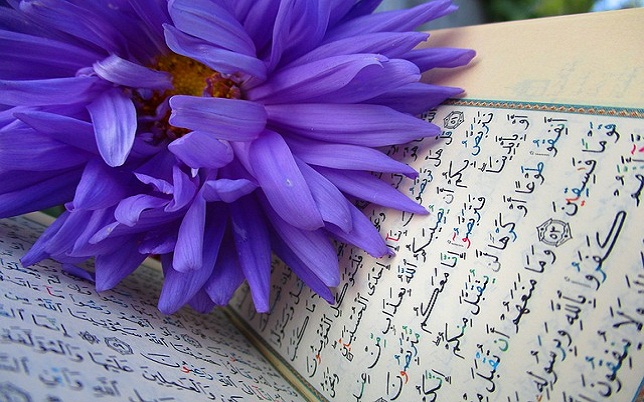In Islam the rites of marriage are very easy and brief. Marriage is a solemn pledge legalizing union between a man and a woman and is regarded in Islam a good deed deserving reward. Only the two words of agreement and acceptance and two witnesses are needed for the performance of marriage. Islam wants to ensure that such a relationship between man and woman is not established in an irresponsible way. That is why marriage is announced and made public by involving two persons from the society as witnesses.
Mehr in Islam
The male partner should consider it necessary to pay to his wife a marriage gift (Mehr) and take the responsibility of protecting her honour and providing her with necessities of life according to his standard of living. Nothing else is needed for marriage.
Mehr is a marriage gift offered by the groom to the bride as a token of love, good will and future financial support. It is a way to assure the bride that the groom wishes to share with her his life, love, and resources. In Islam it is forbidden for the groom to demand any dowry from the family of the bride directly or in an implied way. It is the groom who pays Mehr to the bride.
Marriage of Early Muslims in Islam
The early Muslims performed marriage in a very simple way. A glaring example of it is the marriage of Abdur Rahman bin Awf who was a Companion of the Prophet Muhammad. He had emigrated from Makkah to Madina in love of the Prophet and had a very close relationship with him, but he did not invite even the Prophet to his marriage, although the Prophet’s presence on the occasion would have been a source of blessing and a matter of honour for him. In spite of the fact that the Muslim community in Madinah al-Munawwara was small and closely knit, the Prophet did not even know about this marriage. He learnt about it later. More importantly, Prophet Muhammad did not complain that he was not informed.
How a Muslim Marriage Is Performed
It is closer to the Sunnah (Tradition of the Prophet) that the father or a Wali (In Islamic Jurisprudence, a Wali is a male relative of the bride who is adult and mentally sound and who is entitled by the Islamic Code of Law to act in such matters) of the bride should give her in marriage because the Prophet had himself given his daughter Fatima in marriage to Ali.
At this time two witnesses and a Wakeel (A Wakeel is an authorized representative of a person by his consent in order to conduct his affairs on his behalf) go to the bride to obtain her consent for her marriage with the groom. Generally the witnesses and the Wakeel are members of the family and relatives of the bride.
Then the man who is responsible for performing the marriage delivers a brief sermon which consists of verses of the Quran, relevant sayings of the Prophet, and supplications, all in the Arabic language. He then asks the groom to pronounce his acceptance of his marriage with the girl.
The groom gives his acceptance of the marriage in an audible voice and clear terms. He also offers or promises to offer to the bride a sum of money called Mehr in Islamic terminology. With this the marriage is complete. Then all present in the gathering lift their hands to Allah in supplication and pray for the couple to remain united in love and affection and lead a happy conjugal life.
The Marriage Sermon (Nikah Khutba)
The marriage sermon covers mutual rights and responsibilities of marriage partners. Generally it is given in Arabic. Recently, some scholars in India and Pakistan have adopted the practice of delivering a brief sermon in Urdu after the Arabic sermon to project the true spirit of marriage and responsibilities involved in the language that the people present understand.
Thus instead of becoming an entertainment party, a marriage gathering in Islam is used to inform and instruct the bridegroom and guests about the noble spirit and values of marriage that Islam attempts to inculcate in its followers.
Translation of a Model Marriage Sermon in Islam

O men, fear your Lord who created you from a single soul, and from it created its match, and spread many men and women from the two. Fear Allah in whose name you ask each other (for your rights), and fear (the violation of the rights of) the womb-relations. Surely, Allah is watchful over you. [4:1]

O you who believe, fear Allah, as He should be feared, and let not yourself die save as Muslims. [3: 102]


“O ye who believe! fear God, and (always) say a word directed to the right, that He may make your conduct whole and sound and forgive you your sins; he who obeys Allah and His Prophet, has already attained the highest achievement. “[33:70-71]
“Gentlemen in Islam marriage is not only an observance of a custom or a fulfillment of a desire of the self. Observed with correct intention, the practice of marriage is not just an act of worship but a combination of several acts of worship. It does not involve only one religious law but several religious laws are related to it.
It has a place in the Quran and in the Hadith and is discussed in detail in separate sections in books of Islamic jurisprudence. But unfortunately its true spirit is ignored by careless Muslims more than that of any other Sunnah (a deed established by the Prophet’s practice).
Rather the occasion of marriage is used now-a-days for disobeying Allah, obeying the Satan, gratifying the desires of the self, and adhering to un-Islamic rites and customs.
“The institution of marriage bears a complete message for our lives which is so very well reflected in the verses of the Quran read by Prophet Muhammad on the occasion of a marriage.
In the first verse there is a mention of the genesis of the human race which is indeed very appropriate for this occasion and may be taken here as a good omen as well.
In the beginning Prophet Adam was alone in the world but when Allah joined him with his life partner Eve, the human race multiplied and now the whole world is filled with their progeny. Surely then it is not at all difficult for Allah to increase in number the two persons who are getting married today in His name.
Allah the Almighty says further in the same verse: ‘Reverence through Whom ye demand your mutual (rights).’
Gentlemen! the whole life is covered with the episodes of seeking of help and granting of it. Trade, government, and education, for example, are all inspired by a spirit of goodwill in which one party solicits and the other gratifies. This is a characteristic of civilized life. Marriage is also a civilized way to solicit a person’s consent for joining the other as life partner.
The family of the groom ask another family for a bride for their son suggesting that his life will be completed only through that union. The other family give their happy acceptance. Then the two persons are united in marriage in the name of Allah.
Thus those who may have been totally unknown to each other join each other in trust and intimacy which is inconceivable in any other relationship. The fate of one thus gets united to that of the other and their happiness and gratification become interdependent.
This is indeed, the miracle of Allah’s name which through marriage transforms a forbidden relationship to a legal act and turns an otherwise sinful act into a rewarding deed. Thus marriage revolutionizes the lives of the two persons.
After that Allah the Almighty reminds people to remain mindful of the sanctity of His name on the basis of which they enter into marriage with each other. It would be shameful if one selfishly exploits the rights gained through marriage but ignores the duties involved.
Allah also mentions here that the couple entering into marriage should also remain mindful of the rights of their relatives (“and reverence the wombs that bore you”). There is a need that on the occasion of the establishment of a new relationship the importance of previous relationships is emphasized.
The new relationship through marriage does not nullify the previous relationships. It should not happen that a man remembers the rights of his wife and ignores those of his mother: or that he discards his father in an effort to serve his father-in-law.
If a person thinks that his transgressions in this regard would go unnoticed, he should know that Allah is watching him all the time (“for God ever watches over you”). Allah is indeed such a witness Who is with him all the time, closer to him than even his jugular veins.
In the next verse a bitter but unavoidable reality, the death is mentioned. In fact it requires the courage of a prophet to mention death on a happy occasion such as that of a marriage so that man does not forget his ultimate end and prepares well to depart from the world in the best state of lman (Faith).
The mention of death here implies that no matter how happy and prosperous one’s life may be, one should make sincere efforts that he breathes his last in the state of faith and meets his Lord as one truly faithful to Him.
The third verse of the Quran mentioned above commands the believers to fear Allah and always say what is true and right.
It is as if the groom is being reminded here that by saying the words, “I accept” he makes a serious covenant and takes upon himself a great responsibility.
It is further stated that if a person learns to conduct himself in a responsible manner all the time, his whole life, sayings and doings will reflect truth and honesty making him an ideal figure deserving Allah’s forgiveness and pleasure.
The Quranic verse concludes with the reminder that the real success of a person lies in his obedience to Allah and the Prophet, not in the gratification of the self or adherence to false traditions.”
The translation of Marriage Sermon (Nikah Khutba) ends here.
To distribute dates on the occasion is an act of Sunnah (Prophetic tradition).
Marriage in Islam-A Form of Worship
In Islam marriage is not regarded as merely a fulfillment of a natural human need but it is even considered an act of worship which if is performed with an understanding of higher religious and spiritual values involved, wins to a person a state of closeness to Allah.
The Prophet of Allah (blessings and peace be on him) set a practical example of the noblest possible married life. He also said:
“He is the best among you who is the best for his family, and I am the best for my family”.
The respect for women and sincere consideration for their emotions and sensitivity was Prophet Muhammad’s natural disposition and is not found in the practical lives of even the acclaimed champions of women’s cause or famous spiritual leaders and saints; in fact it is difficult to find it even in the lives of other Prophets (blessings and peace be on them).
Prophet Muhammad’s respectful treatment of his pious wives, participation in their recreations (which were Islamically permissible), thoughtfulness for their emotions, and justice in dealing with them are qualities that remain unparallelled.
Even with children the Prophet of Allah was so considerate that he cut short his prayers (Salah) if a child of a woman praying behind him started crying during the prayers. This was the highest level of sacrifice on his part as no other act was dearer to him than performing prayers.

